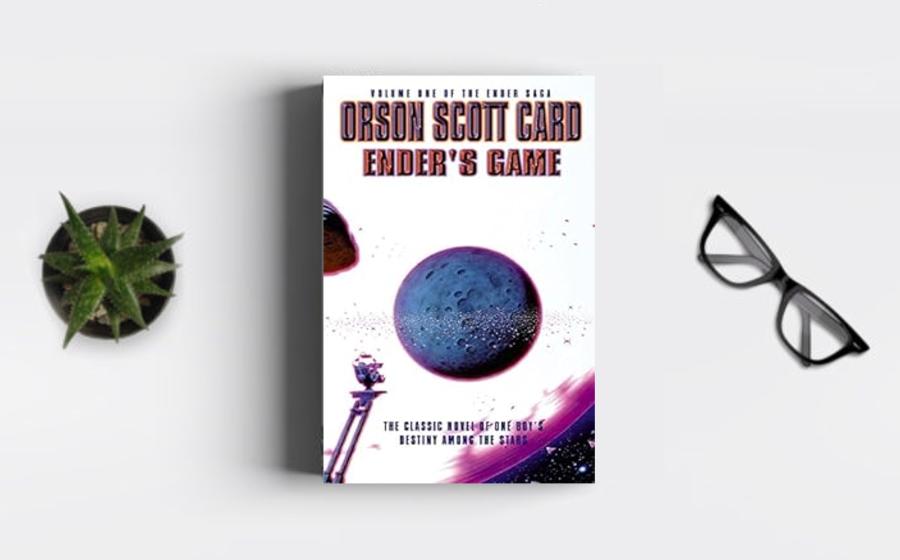In the expansive universe of science fiction, Orson
Scott Card's "Ender's Game" emerges as a seminal work, a
novel that transcends the boundaries of traditional
storytelling to explore the complexities of war,
leadership, and the indomitable spirit of youth. As we
delve into the pages of this science fiction
masterpiece, it becomes evident that "Ender's Game" is
not merely a tale of futuristic conflict; it is a
narrative that weaves together strategic brilliance,
ethical dilemmas, and the resilience of childhood. This
work has earned its esteemed place among the top books
of all time, offering readers a profound journey through
the intricacies of interstellar warfare and the human
condition.
At the heart of "Ender's Game" is the
narrative of Andrew "Ender" Wiggin, a brilliant young
strategist selected for training at a military academy
in preparation for an imminent alien invasion. In a
manner reminiscent of literary narratives that thrust
young protagonists into positions of leadership, Card's
narrative becomes a thematic tapestry, a strategic
odyssey that invites readers to witness the emergence of
a tactical genius in the form of a child.
In the
tradition of literary quests that propel young
characters into extraordinary circumstances, Card's
exploration of Ender Wiggin's training becomes a
strategic journey, an epic that propels readers into the
intricate tapestry of interstellar warfare. "Ender's
Game" transforms into a science fiction saga, where the
brilliance of a child becomes a thematic motif that sets
the stage for an exploration of leadership, morality,
and the boundless potential of youth. Card's narrative
becomes a tactical tapestry, weaving together threads of
military strategy, ethical dilemmas, and the profound
growth of a young mind.
Card introduces Battle
School, a military training facility in Earth's orbit
where gifted children undergo rigorous training in the
art of war. In the tradition of literary settings that
serve as crucibles for character development, Battle
School becomes a thematic undercurrent that defines the
science fiction landscape of "Ender's Game." The
isolation and pressure of training become narrative
devices, inviting readers to witness the transformation
of children into strategic prodigies.
Battle
School becomes a science fiction setting that resonates
with the literary tradition of portraying challenging
environments for character growth. Card's insights add
layers of meaning to the text, transforming "Ender's
Game" into a novel where the crucible of Battle School
becomes a central theme. Readers are prompted to
contemplate the effects of isolation, pressure, and
intense training on the psychological and strategic
development of young minds.
Ender Wiggin's
tactical brilliance becomes a focal point of the
narrative, a quality that sets him apart as a military
prodigy. In the tradition of literary protagonists with
exceptional skills, Ender's strategic insights become a
thematic thread that runs through "Ender's Game." The
ethical dilemmas inherent in his brilliance become
narrative devices, inviting readers to reflect on the
consequences of exceptional talent in the context of
war.
Ender's tactical brilliance becomes a
science fiction motif that resonates with the literary
tradition of portraying exceptional abilities in
characters. Card's exploration adds depth to the text,
transforming "Ender's Game" into a novel where the
strategic insights of a young protagonist become a
central theme. Readers are encouraged to contemplate the
ethical challenges faced by those gifted with
extraordinary talents, especially when those talents are
harnessed for military purposes.
Card introduces
Command School, an advanced training facility where
Ender faces his ultimate challenge. In the tradition of
literary climaxes that test characters to their limits,
Command School becomes a thematic tapestry that weaves
through the latter part of "Ender's Game." The final
frontier of strategic prowess becomes a narrative
device, inviting readers to witness the culmination of
Ender's training and the profound decisions he must
make.
Command School becomes a science fiction
setting that resonates with the literary tradition of
presenting ultimate challenges for protagonists. Card's
exploration adds a layer of intensity to the text,
transforming "Ender's Game" into a novel where Command
School becomes a central theme. Readers are prompted to
contemplate the sacrifices and choices made by
characters when faced with the apex of their strategic
abilities.
Card introduces the Buggers, an alien
species at war with humanity. In the tradition of
literary conflicts with complex adversaries, the Buggers
become a thematic undercurrent that defines the moral
landscape of "Ender's Game." The ethical complexity of
war and the nature of the enemy become narrative
devices, inviting readers to ponder the moral
implications of interstellar conflict.
The
Buggers become a science fiction adversary that
resonates with the literary tradition of presenting
morally complex foes. Card's insights add layers of
nuance to the text, transforming "Ender's Game" into a
novel where the moral dimensions of war become a central
theme. Readers are encouraged to question the ethics of
conflict and consider the consequences of dehumanizing
adversaries, even in the context of an interstellar war.
Card introduces a twist in the narrative, a
revelation that reshapes the reader's understanding of
Ender's actions. In the tradition of literary twists
that prompt moral reflection, this revelation becomes a
thematic tapestry that weaves through the conclusion of
"Ender's Game." The weight of leadership and the
consequences of Ender's brilliance become narrative
devices, inviting readers to reevaluate their
perceptions of the protagonist.
The twist becomes
a literary device that resonates with the tradition of
surprising revelations in narratives. Card's exploration
adds depth to the text, transforming "Ender's Game" into
a novel where the moral reflections prompted by the
twist become a central theme. Readers are prompted to
reconsider the complexities of leadership, moral
responsibility, and the true cost of victory.
It is evident that Orson Scott Card's science fiction opus is more than a futuristic war story; it is a symphony of strategic brilliance that harmonizes the concepts of Battle School, Ender's tactical insights, Command School, the Buggers, and the moral reflections prompted by the twist. In the tradition of literary works that orchestrate diverse themes into a cohesive composition.






